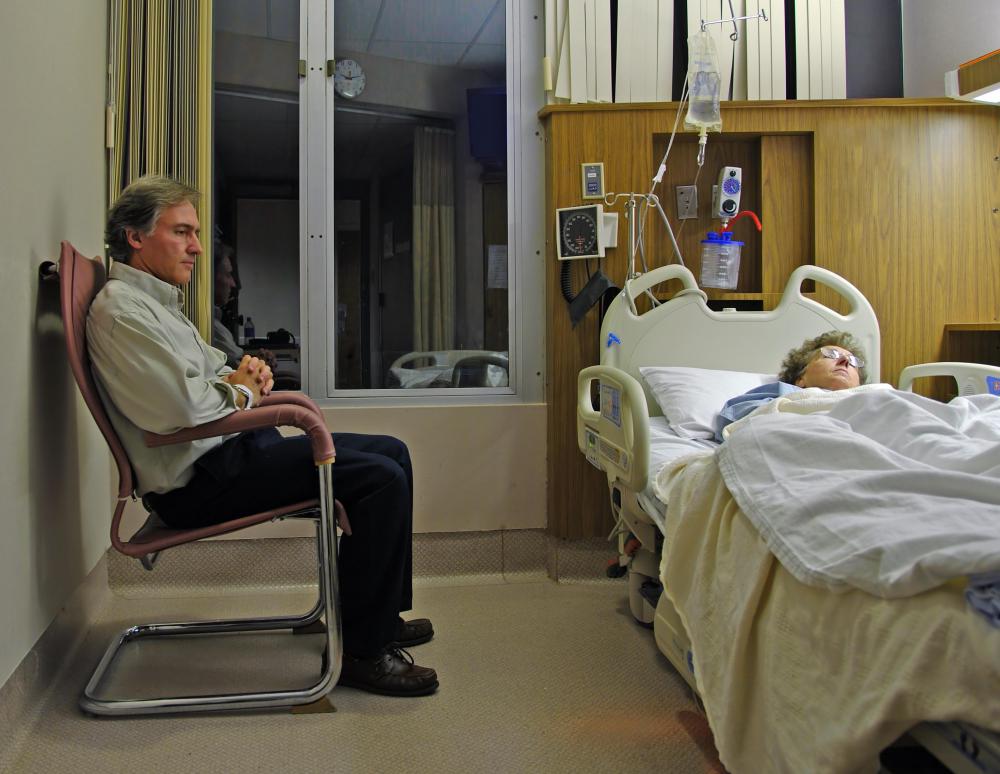At TheHealthBoard, we're committed to delivering accurate, trustworthy information. Our expert-authored content is rigorously fact-checked and sourced from credible authorities. Discover how we uphold the highest standards in providing you with reliable knowledge.
What is Hyponatremia?
Hyponatremia is a medical term which refers to a dangerously low level of sodium in the body. Sodium, along with other electrolytes, is a crucial mineral in human nutrition that helps to transport water through the body, and helps to regulate the nerves and major organs such as the heart. When a human body experiences hyponatremia, the results can be fatal if the condition is not promptly addressed. Certain people are more at risk for this condition than others, and in all cases the prognosis is best if the problem is identified early.
Fortunately, true hyponatremia is very rare. There are a number of causes for the condition, although the most commonly known is water intoxication. Water intoxication happens when someone consumes an excessive amount of water, heavily diluting the concentration of electrolytes in the blood. The condition can also occur when someone sweats excessively, losing a large amount of electrolytes, or in elderly patients who cannot regulate their internal electrolyte balance as well. Because it has numerous causes, the condition can sometimes indicate a medical problem which needs to be treated.

The early signs of hyponatremia include vomiting, nausea, headache, and a general feeling of malaise. If the condition is not identified and treated, the patient's condition will grow worse, and he or she may experience convulsions, a state of stupor, or, in extreme cases, coma. Because the symptoms are vague, doctors need to be alert for patients who appear to have an altered level of consciousness and are at risk. If you experience symptoms and you have been drinking a lot of water or exercising heavily, you should alert the attending doctor.

To correct hyponatremia, a doctor will administer intravenous electrolytes, or have the patient take them by mouth. If caught early, the condition can be fairly easily treated, but in more extreme cases, the prognosis is more uncertain. Once the patient has stabilized, it is important to identify the root cause of the condition to ensure that the condition will not happen again, and to treat any underlying medical conditions.

High performance athletes are at the greatest risk for hyponatremia, as they work out hard, losing electrolytes through sweat, and drink a lot of water to stay hydrated. To prevent the conditon, athletes should always consume electrolytes with their water, and should be aware of their physical limitations. Athletic coaches should keep an eye on the men and women under their care to catch early warning signs and address them.
AS FEATURED ON:
AS FEATURED ON:















Discussion Comments
When my sister was diagnosed with a kidney disease, her doctor told her to drink plenty of water and lower her sodium intake. Well, she was so worried about her condition that she took it to the extreme.
She stopped using salt and eating prepackaged foods. The only sodium she got was what occurred naturally. She drank nothing but water, and she drank it all day long.
She thought that she was doing her kidneys good. However, she ended up getting hyponatremia. She then had her doctor give her specific details about how to achieve her desired sodium level and water intake.
My little brother got hyponatremia during football practice in August. I hate that the season starts during the hottest part of the year, and I always worry about his health.
At this particular practice, he had a sore throat, which made it hurt when he swallowed. So, he did not drink enough fluids to replace what he lost through sweating.
His clothes were drenched. Yet, he could only sip because of the pain. After about an hour, he fell over in the hot sun and started convulsing.
The coach called an ambulance. He had to stay in the hospital a few days to recover, because in addition to his hyponatremia, he had a strep infection that needed antibiotic treatment.
When my cousin started to get into all natural foods and herbal remedies, she developed hyponatremia. She had come to believe that the best way to flush her body of toxins was to drink a ton of water. This would make her urinate more and it made it easier to defecate.
Right along with the toxins, she flushed out her electrolytes and sodium. She ended up very ill to the point that she became incoherent. Her husband rushed her to the emergency room, where she lapsed into a coma.
By pumping her full of what she had flushed out, they were able to stabilize her. She came to realize that maybe a normal way of eating and drinking wasn’t so bad after all.
I had a friend in high school who developed hyponatremia. She loved food too much to ever get an eating disorder, but she obsessed over her weight another way. She worked out constantly, and she drank lots of water to flush out the fat.
I remember one day she was out for a run, and she stopped by my house. She told me she felt sick. She came inside, went to the bathroom, and began vomiting. She said she felt really tired.
I talked her into going to the doctor. When he found out that she had been working out and drinking excessive amounts of water, he knew what was wrong right away.
She had to go to the hospital and get an IV to restore her electrolytes. She stayed there overnight, and it scared her enough to slow down her workouts.
Post your comments